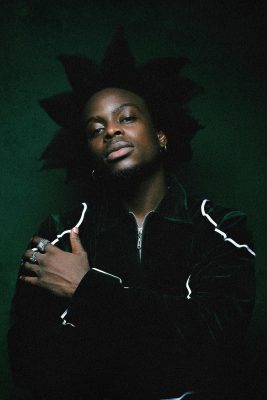On his self-titled 11th album, Olamidé, star Olamide blends rap, RnB and Afropop across 21 tracks and 46 minutes—showcasing his evolved vocal skills, genre-spanning vision and storyteller’s flair.
Olamide has always proved his mettle as a method artist, since his Rapsodi debut studio album in 2011. Over the years, his constant evolution has defined his growth as a rapper, singer, music executive, and evergreen entertainer.
On his just-released self-titled 11th studio album, the award-winning rapper retools his professional identity as a homegrown and globally-minded superstar.
Notes on Olamidé
The album begins with a dreamy Prelude (with fast-rising singer Fxrtune) that sets an emotive and reflective tone. Clocking in at 46 minutes, it’s one of the musician’s lengthiest albums in recent times. Interestingly, before the slow decline of lengthy spins around the late 2010s, Olamide’s first five albums each surpassed an hour.
His next track, Hasibunallah, finds him singing with gratitude over lush choral melodies and subtle drum kicks. He recounts his blessings and motivations and attributes them to God’s graces upon his life. “Oluwa wey dey do am for me/ E no go ever give up on me,” he sings.
The third track, Kai!, (with Wizkid) brings back the party-starting energy that has marked their collaborations including hit tracks like Omo to Shan (2013), Kana (2018), Confam Ni (2016), and Totori (2019).
The track feels like a breezy conversation between two friends as they talk about the ‘Badman love’, and life as superstars, all the while serenaded by his producers Semzi and Eskeezondbeat’s hearty trumpets on the pop jam. The two producers, alongside P.Priime, had core production work across the album, while other notable beat smiths that worked on the record include Yung Willis, Larrylanes, B.Banks, Magicsticks, and ID Cabasa.
On the fourth track, Luvaluvah, Olamide returns with a sample of the 1998 Lauryn Hill classic, Can’t Get Enough Of You, off her Miseducation of Lauryn Hill album, repeating: “Luvaluvah mi / Don’t you suffer me / Anything for you, I no fit lie aje!”. This is his stealthy attempt at creating a powerful first quarter of the album, showcasing his improved singing skill and lover-boy persona.
While we get to see less family drama from Olamide on the social media space, the rapper continues to recount the intriguing love stories that shaped his evolution as a person, family man, and artist.
The fifth song on the record, Billionaire’s Club (with Wizkid and Darkoo), spins off with a feel-good RnB-pop ambience as he shares nuggets he’s gleaned on creating and sustaining wealth. He continues his soul-leaning pop voyage on the record, with cinematic violins serenading Darkoo’s outro on the track. This particular track brims with the potential to become a global crossover hit, especially with its mellowed sound direction and choice of features.
‘Rap Prodigy’
Across the album, Olamide’s reputation as a rap prodigy son tracks like Free (with Seyi Vibez, Muyeez) where he sing-raps with a bossy, slow-paced swag, while Seyi Vibez and Muyeez add colour with their distinct Fuji/Apala-toned singing. He shows the same prowess on 1Shot, where he raps about how he had to “Go make mommy proud/ Shock awon weyrey doubt (Disprove all your naysayers)” while reminding his fans of his pedigree as a naturally talented rapper.
Indika, Olamide’s most anticipated collab with American hip-hop legend Dr Dre and Spinall, kicks off with Dr Dre’s chilled slow-rap on the superstar life. “International funds, I’m overseas on ’em/ This is a breath of fresh air, I put the breeze on ’em/ Steppin’ on over this line there’s no borders/ Can’t have closed minds on these open waters/ Whatever she on, I can afford it.” Olamide follows, pulling his weight on the song with his verse, which, arguably, ranks among his top three best rap verses on the album, after 1Shot, and Free.
The entire album is laden with more mellowed, laid-back RnB and Pop fusions, with a ting of hard-hitting Street Hop, especially on songs like 1Shot and Free, and dance music.
Another pleasure point on the album would be the smooth quality of all the collaborations: Paris, (with Nigerienne singer Fadí), Rain (with Jamaican popstar Popcaan), as well as the posse-cut 99 (with his YBNL protogés Asake and Young Jonn, respectively, Seyi Vibez, and Zimbabwean singer Daecolm).
On Paris, Olamide unlocks a softened meditative groove, with Fadí’s lithe vocals floating over orchestral chord progressions with the piano and violins. On Rain, he reflects on his ‘special woman’ and the importance of showing love to the women in one’s life, preaching his powerful message over soothing reggaeton-tuned RnB melodies.
On 99, he bares his experimental ideas on the party-starting Amapiano jam, with seamless chemistry between all the singers, except Asake’s rather lowered-out delivery and recording.
Across the collaborations he explores several melodic terrains, with voices that complement each recording, embracing his bold ideas that stretch his musical identity as a globally appealing musician.
The Gaps
Per flaws, the album contained some waning songs including Duro, Ruba, and the album’s outro Stronger (with Boj), which point towards recording and mixing gaps. Also, cohesively, the album feels too relaxed and mellowed, revealing gaps in tracklisting, recording and audio mixing.
With 10 albums previously within his arsenal, Olamide’s voyage as a musician was meant to reasonably drift across familiar waters. However, on Olamidé, he presents newer expressions of his less-familiar strength, which is singing. Most of the songs make for a great listen, exposing us to a modern-day or ‘hybrid’ version of the music executive, rapper, and singer.
Nonetheless, whenever and wherever the Fuji-tuned jam Hybrid or the Amapiano-leaning Lalakipo comes on, one is poised to throw caution to the wind and bask in the euphoria of the ‘gbedu’ (party jam). This strength of the singer, creating music that is firmly rooted in expertise and devotion to his primary audience, while still expanding his scope towards European and American palettes is exactly the rebrand or ‘miseducation’ that the album aims to communicate.
Thanks to Lauryn Hill, for popularising the concept of consistent self-discovery and adapting one’s music style to fit that growth; because on Olamidé, the musical growth is obvious, upward, and, hopefully, transient.








